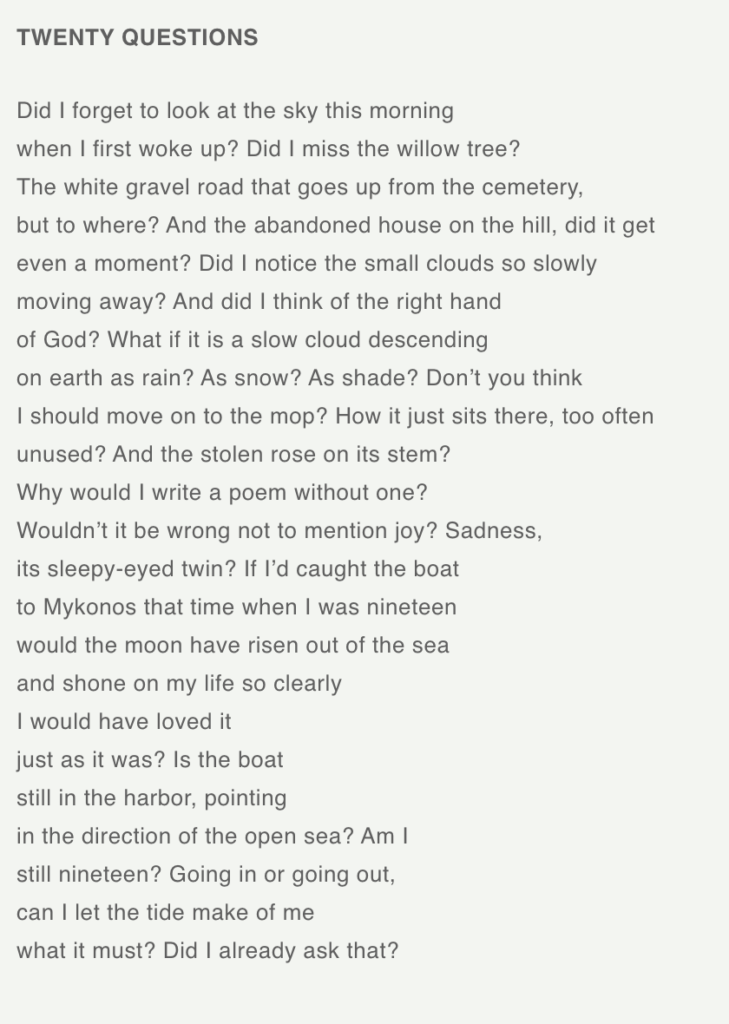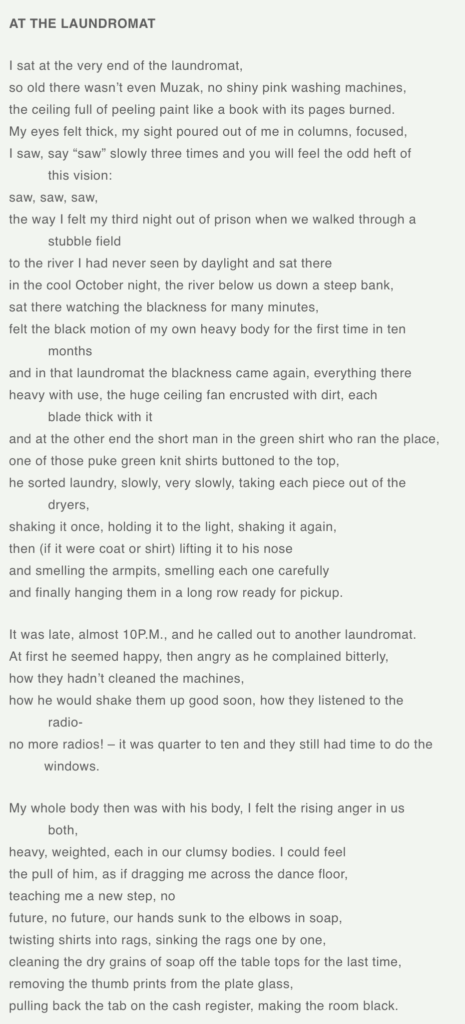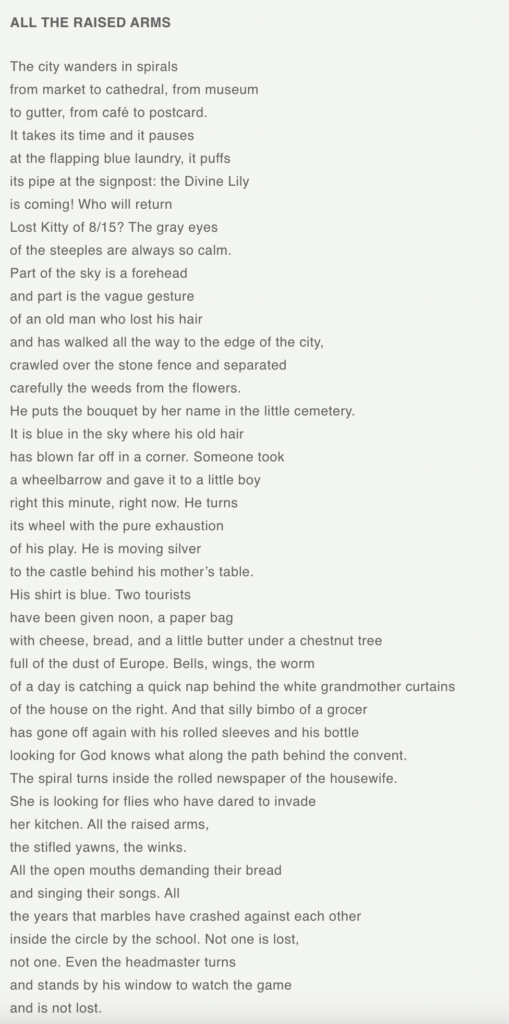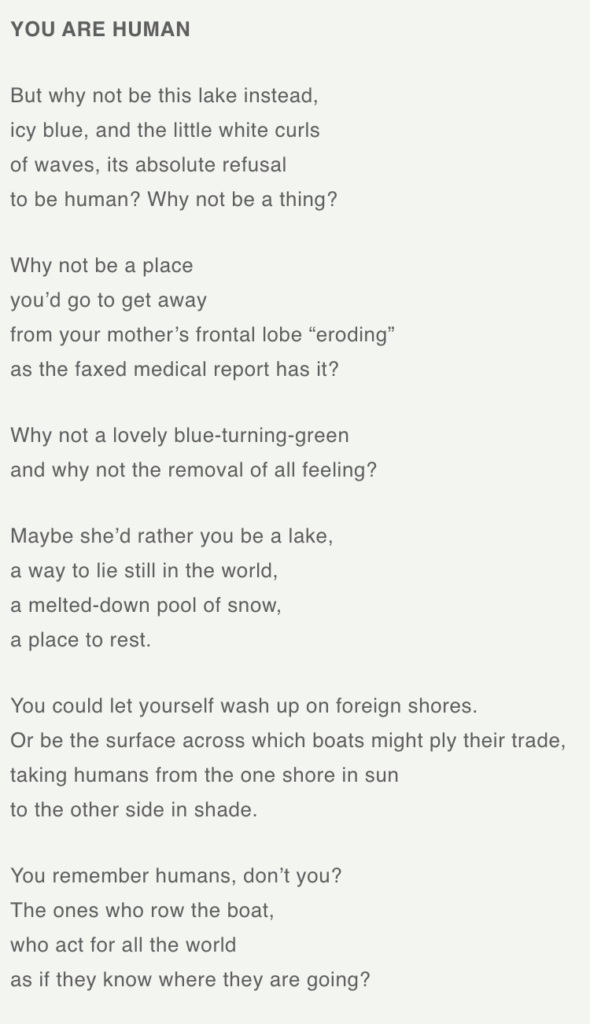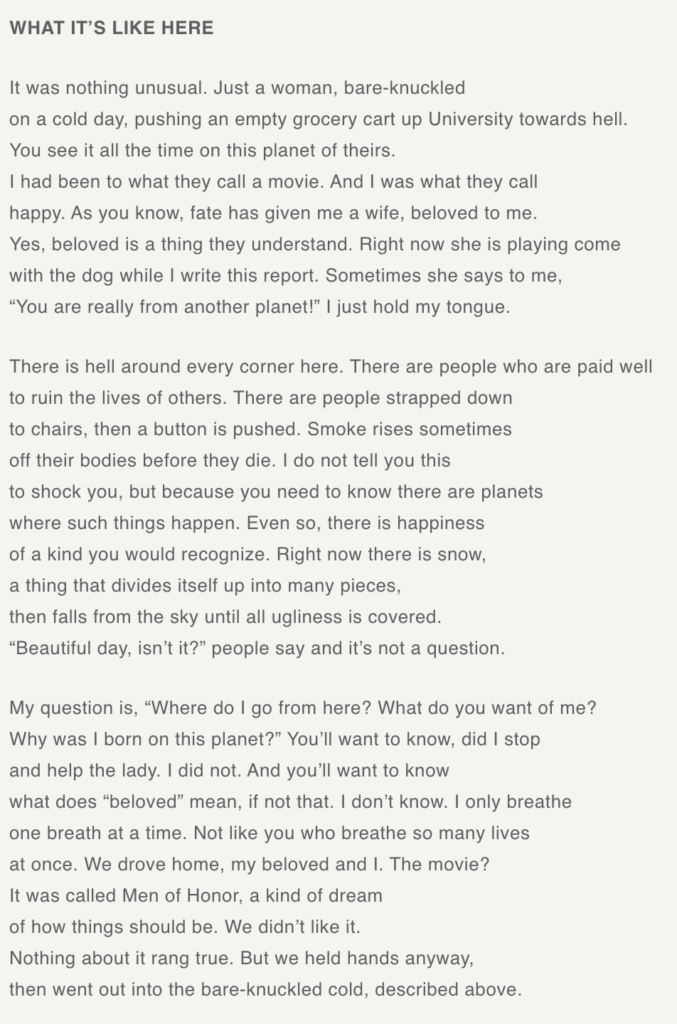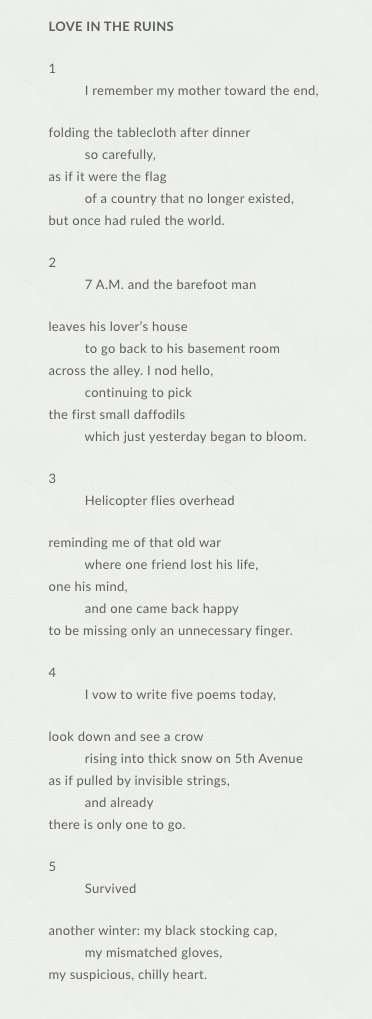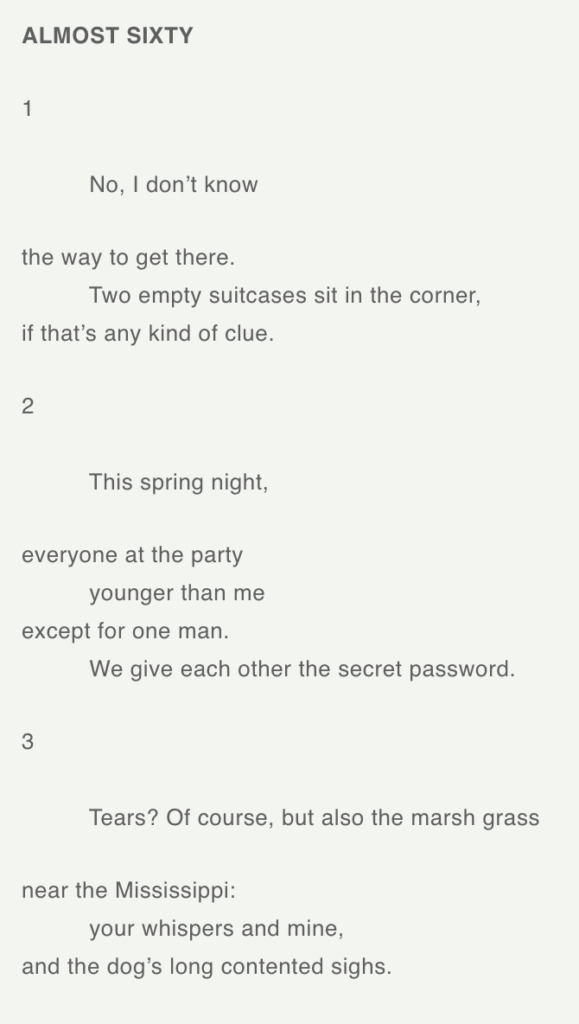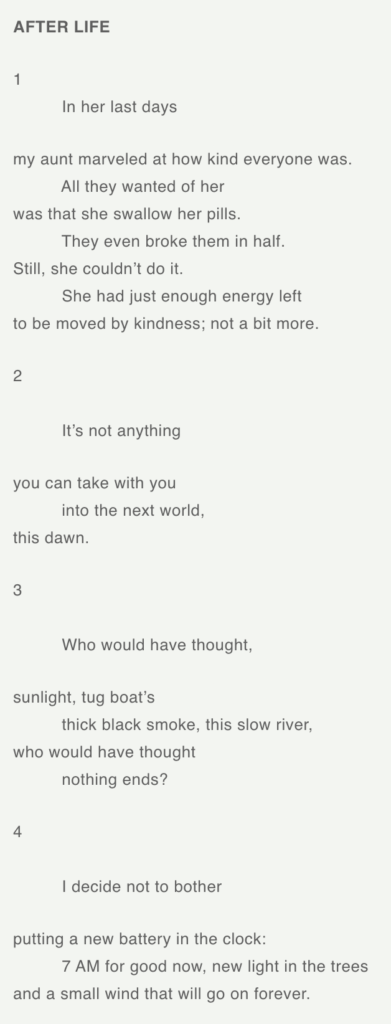poems
Featured Poems
⊕ click on the poem title to open/close window for full text:
TWENTY QUESTIONS
Did I forget to look at the sky this morning
when I first woke up? Did I miss the willow tree?
The white gravel road that goes up from the cemetery,
but to where? And the abandoned house on the hill, did it get
even a moment? Did I notice the small clouds so slowly
moving away? And did I think of the right hand
of God? What if it is a slow cloud descending
on earth as rain? As snow? As shade? Don’t you think
I should move on to the mop? How it just sits there, too often
unused? And the stolen rose on its stem?
Why would I write a poem without one?
Wouldn’t it be wrong not to mention joy? Sadness,
its sleepy-eyed twin? If I’d caught the boat
to Mykonos that time when I was nineteen
would the moon have risen out of the sea
and shone on my life so clearly
I would have loved it
just as it was? Is the boat
still in the harbor, pointing
in the direction of the open sea? Am I
still nineteen? Going in or going out,
can I let the tide make of me
what it must? Did I already ask that?
–
(from NEW POEMS, 2013)
AT THE LAUNDROMAT
I sat at the very end of the laundromat,
so old there wasn’t even Muzak, no shiny pink washing machines,
the ceiling full of peeling paint like a book with its pages burned.
My eyes felt thick, my sight poured out of me in columns, focused,
I saw, say “saw” slowly three times and you will feel the odd heft of
this vision:
saw, saw, saw,
the way I felt my third night out of prison when we walked through a
stubble field
to the river I had never seen by daylight and sat there
in the cool October night, the river below us down a steep bank,
sat there watching the blackness for many minutes,
felt the black motion of my own heavy body for the first time in ten
months
and in that laundromat the blackness came again, everything there
heavy with use, the huge ceiling fan encrusted with dirt, each
blade thick with it
and at the other end the short man in the green shirt who ran the place,
one of those puke green knit shirts buttoned to the top,
he sorted laundry, slowly, very slowly, taking each piece out of the
dryers,
shaking it once, holding it to the light, shaking it again,
then (if it were coat or shirt) lifting it to his nose
and smelling the armpits, smelling each one carefully
and finally hanging them in a long row ready for pickup.
It was late, almost 10P.M., and he called out to another laundromat.
At first he seemed happy, then angry as he complained bitterly,
how they hadn’t cleaned the machines,
how he would shake them up good soon, how they listened to the
radio-
no more radios! – it was quarter to ten and they still had time to do the
windows.
My whole body then was with his body, I felt the rising anger in us
both,
heavy, weighted, each in our clumsy bodies. I could feel
the pull of him, as if dragging me across the dance floor,
teaching me a new step, no
future, no future, our hands sunk to the elbows in soap,
twisting shirts into rags, sinking the rags one by one,
cleaning the dry grains of soap off the table tops for the last time,
removing the thumb prints from the plate glass,
pulling back the tab on the cash register, making the room black.
–
(from THE NEW BODY, 1978)
ALL THE RAISED ARMS
The city wanders in spirals
from market to cathedral, from museum
to gutter, from café to postcard.
It takes its time and it pauses
at the flapping blue laundry, it puffs
its pipe at the signpost: the Divine Lily
is coming! Who will return
Lost Kitty of 8/15? The gray eyes
of the steeples are always so calm.
Part of the sky is a forehead
and part is the vague gesture
of an old man who lost his hair
and has walked all the way to the edge of the city,
crawled over the stone fence and separated
carefully the weeds from the flowers.
He puts the bouquet by her name in the little cemetery.
It is blue in the sky where his old hair
has blown far off in a corner. Someone took
a wheelbarrow and gave it to a little boy
right this minute, right now. He turns
its wheel with the pure exhaustion
of his play. He is moving silver
to the castle behind his mother’s table.
His shirt is blue. Two tourists
have been given noon, a paper bag
with cheese, bread, and a little butter under a chestnut tree
full of the dust of Europe. Bells, wings, the worm
of a day is catching a quick nap behind the white grandmother curtains
of the house on the right. And that silly bimbo of a grocer
has gone off again with his rolled sleeves and his bottle
looking for God knows what along the path behind the convent.
The spiral turns inside the rolled newspaper of the housewife.
She is looking for flies who have dared to invade
her kitchen. All the raised arms,
the stifled yawns, the winks.
All the open mouths demanding their bread
and singing their songs. All
the years that marbles have crashed against each other
inside the circle by the school. Not one is lost,
not one. Even the headmaster turns
and stands by his window to watch the game
and is not lost.
–
(from THE FREEDOM OF HISTORY, 1988)
QUEEN ELIZABETH ON TV
It was my first look at the world
on a small screen: her coronation
in my aunt’s living room. It’s amazing
how close I came that day to loving
what I saw without question. A small boy
staring at a queen. Both of us were excited.
Both knew it was crazy how things happen
beyond our power to understand them.
The queen and I, we were enchanted: earth
and all its glories seemed enough. Have pity
on us, we who would have loved to rule
our whole lives without incident. We who
have spent our reigns dissolving empires
into warring nations. It was in black
and white, a tiny screen, but it was godly
how she walked down that long aisle alone,
only her heavy train behind her, only
her failing empire before.
We kings and queens cannot help our accidents
of birth: born to rule, born to lose it all.
–
(from THE LONG EXPERIENCE OF LOVE, 1995)
THINK OF THE WORLD AS A WEEK ALONE
As if someone said, go, then you went,
and this was what you were given: a night
at St. Martin’s-in-the-Fields, a long evening
with the next-to-last of Beethoven’s quartets.
You tried to listen as if listening
were all. But in that interval between movements,
where Beethoven intended only silence
to accompany the intense and fussy preparations
for the unfinished music that lay ahead,
shouts and screams entered from across the street
in front of the South African embassy, whitely
chaste like an untouched wedding cake.
Think of the world as a week alone in a strange city.
But think of it especially as this one night
when after the concert, nearby at Trafalgar Square,
two women stood together, oblivious
of you, and said their good-byes.
The one getting on the bus was in tears.
The other, older, more sure of herself and stronger,
said, pray for me. Then, in case
it wasn’t absolutely clear, said again, demanding it
calmly, pray for me. The other had no choice
in the matter. Then,
just as you were sure it was over,
she leaned out the window to her friend, I
love you, she said, and it was so unbearably true
the three of you each stood a moment, stunned, not thinking
of what had to happen next: that the bus must take her away.
The demonstration was fading, hundreds of black balloons
had been released in the name of a freedom
that exists somewhere: if not in this world,
then surely someplace nearby.
When the 24 arrived, you sat upstairs,
a moon on your left as you moved up Charing Cross
and took the long way back, Camden Town,
Highgate, and all the rest. By the end of the route,
you were famished. At the Curry Paradise
they put you by the window, but you’d had enough
of the world for one day. It was time for a postcard
to someone familiar, someone from your other country.
Think of the world as a week alone, you began to write.
On the reverse was Keats’ House.
You could have walked there after dinner
if you’d wished, could even have stood alone
in the darkness under his favorite tree, the one
he wrote of more than once. But you didn’t want
to push your luck too far.
Think of how you just happened to appear
this week and no other, at the exact moment two friends
said their good-byes overheard by you
who had nothing more important to do, not then, not ever,
than to stand like that in the middle of such parting.
Think of the world as a strange city,
only partly yours. Think of it as silence that should have
let you rest between movements, but didn’t. Think
of it as black balloons released into a blacker sky,
as a moment under a famous tree
that almost happened, or as the plush paradise
of a dark booth: spiced and unfamiliar food. You were so hungry,
and this is the meal you wanted, the one you needed to eat.
–
(from THE LONG EXPERIENCE OF LOVE, 1995)
YOU ARE HUMAN
But why not be this lake instead,
icy blue, and the little white curls
of waves, its absolute refusal
to be human? Why not be a thing?
Why not be a place
you’d go to get away
from your mother’s frontal lobe “eroding”
as the faxed medical report has it?
Why not a lovely blue-turning-green
and why not the removal of all feeling?
Maybe she’d rather you be a lake,
a way to lie still in the world,
a melted-down pool of snow,
a place to rest.
You could let yourself wash up on foreign shores.
Or be the surface across which boats might ply their trade,
taking humans from the one shore in sun
to the other side in shade.
You remember humans, don’t you?
The ones who row the boat,
who act for all the world
as if they know where they are going?
–
(from LIGHTNING AT DINNER, 2005)
LIGHTNING AT DINNER
Basta! shouts the waiter,
then laughs each time the sky
is rent, delighted.
“Such a long journey,”
my failing mother said,
her voice calm and steady,
crossing seven time zones.
Light gone,
you and I sit in the dark. Our hands
touch, finally, hours
after our argument.
This sudden warmth, palm
to palm: as when thunder stops,
the suddenness of all that silence.
Or the aftershock – deafening –
when an only son
is given to understand
his mother’s business with him
is completely done.
–
(from LIGHTNING AT DINNER, 2005)
WHAT IT'S LIKE HERE
It was nothing unusual. Just a woman, bare-knuckled
on a cold day, pushing an empty grocery cart up University towards hell.
You see it all the time on this planet of theirs.
I had been to what they call a movie. And I was what they call
happy. As you know, fate has given me a wife, beloved to me.
Yes, beloved is a thing they understand. Right now she is playing come
with the dog while I write this report. Sometimes she says to me,
“You are really from another planet!” I just hold my tongue.
There is hell around every corner here. There are people who are paid well
to ruin the lives of others. There are people strapped down
to chairs, then a button is pushed. Smoke rises sometimes
off their bodies before they die. I do not tell you this
to shock you, but because you need to know there are planets
where such things happen. Even so, there is happiness
of a kind you would recognize. Right now there is snow,
a thing that divides itself up into many pieces,
then falls from the sky until all ugliness is covered.
“Beautiful day, isn’t it?” people say and it’s not a question.
My question is, “Where do I go from here? What do you want of me?
Why was I born on this planet?” You’ll want to know, did I stop
and help the lady. I did not. And you’ll want to know
what does “beloved” mean, if not that. I don’t know. I only breathe
one breath at a time. Not like you who breathe so many lives
at once. We drove home, my beloved and I. The movie?
It was called Men of Honor, a kind of dream
of how things should be. We didn’t like it.
Nothing about it rang true. But we held hands anyway,
then went out into the bare-knuckled cold, described above.
–
(from LIGHTNING AT DINNER, 2005)
STRANGE WORLD
In the life before this one,
these evergreens
draped
with a thickly-needled hush,
these bearers of fragrant shadows
smelling faintly of another world
as babies do after their bath–
in the life before this one,
these trees were hermits
who prayed steadily
through the long nights of self-hatred
and the even longer days
filled with wearisome unending fear.
Because of their stubborn devotion
to the invisible god
in which they believed
despite all lack of evidence,
they were allowed to come back
rooted in the deep earth of humility,
this time unafraid of the darkness
or the light.
Now they no longer need
to pray with words:
their whole bodies rise up
in thick-barked praise,
in needles shaking with delight,
even as they sink down
into secret black rivers
of roots
which circle the earth
in a slow measured flowing
unbothered
by the great triumphs
that occur on earth,
or the even greater failures.
We are not such marvelous hermits
and never will be.
These trees are from god.
And if it turns out there is no god,
still they have found a way
to come from him.
Strange and pitiable world–
it is still possible
for us to walk by an evergreen
and not bow our heads in prayer
as we would bow our heads
before any god
suddenly put in our path,
any god
singing of heaven and earth,
of darkness and light,
of the world to come
and the world that has always been.
–
(from LIGHTNING AT DINNER, 2005)
LOVE IN THE RUINS
1
I remember my mother toward the end,
folding the tablecloth after dinner
so carefully,
as if it were the flag
of a country that no longer existed,
but once had ruled the world.
2
7 A.M. and the barefoot man
leaves his lover’s house
to go back to his basement room
across the alley. I nod hello,
continuing to pick
the first small daffodils
which just yesterday began to bloom
·
3
Helicopter flies overhead
reminding me of that old war
where one friend lost his life,
one his mind,
and one came back happy
to be missing only an unnecessary finger.
4
I vow to write five poems today,
look down and see a crow
rising into thick snow on 5th Avenue
as if pulled by invisible strings,
and already
there is only one to go.
5
Survived
another winter: my black stocking cap,
my mismatched gloves,
my suspicious, chilly heart.
–
(from INVISIBLE STRINGS, 2011)
ALMOST SIXTY
1
No, I don’t know
the way to get there.
Two empty suitcases sit in the corner,
if that’s any kind of clue.
2
This spring night,
everyone at the party
younger than me
except for one man.
We give each other the secret password.
3
Tears? Of course, but also the marsh grass
near the Mississippi:
your whispers and mine,
and the dog’s long contented sighs.
–
(from INVISIBLE STRINGS 2011)
AFTER LIFE
1
In her last days
my aunt marveled at how kind everyone was.
All they wanted of her
was that she swallow her pills.
They even broke them in half.
Still, she couldn’t do it.
She had just enough energy left
to be moved by kindness; not a bit more.
2
It’s not anything
you can take with you
into the next world,
this dawn.
3
Who would have thought,
sunlight, tug boat’s
thick black smoke, this slow river,
who would have thought
nothing ends?
4
I decide not to bother
putting a new battery in the clock:
7 AM for good now, new light in the trees
and a small wind that will go on forever.
–
(from INVISIBLE STRINGS, 2011

